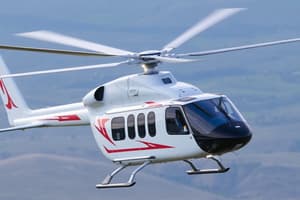Podcast
Questions and Answers
What is the primary component of Earth's atmosphere?
What is the primary component of Earth's atmosphere?
- Helium
- Oxygen
- Nitrogen (correct)
- Carbon Dioxide
Which of the following characteristics is NOT associated with air?
Which of the following characteristics is NOT associated with air?
- Density
- Temperature
- Weight
- Visibility (correct)
How does air respond to changes in pressure?
How does air respond to changes in pressure?
- It loses its mass.
- It flows and changes shape. (correct)
- It expands indefinitely.
- It becomes solid.
Which gas comprises the smallest percentage of Earth's atmosphere?
Which gas comprises the smallest percentage of Earth's atmosphere?
What property of air allows it to flow and change shape?
What property of air allows it to flow and change shape?
What does the term 'aerodynamics' specifically refer to?
What does the term 'aerodynamics' specifically refer to?
What are the two Greek components of the word 'aerodynamics' and their meanings?
What are the two Greek components of the word 'aerodynamics' and their meanings?
Which of the following best describes 'aerodynamics'?
Which of the following best describes 'aerodynamics'?
What is the primary focus of aerodynamics in the context of flight?
What is the primary focus of aerodynamics in the context of flight?
Which of the following is NOT a goal of studying aerodynamics?
Which of the following is NOT a goal of studying aerodynamics?
Which of the following statements about humidity and airplane flight is correct?
Which of the following statements about humidity and airplane flight is correct?
How is viscosity defined?
How is viscosity defined?
Which of the following fluids has the highest viscosity?
Which of the following fluids has the highest viscosity?
What effect does water vapor have on airplane takeoff in humid conditions?
What effect does water vapor have on airplane takeoff in humid conditions?
In which scenario would you expect a stick to spin more freely?
In which scenario would you expect a stick to spin more freely?
What defines pressure in a scientific context?
What defines pressure in a scientific context?
At what altitude does the Stratosphere begin?
At what altitude does the Stratosphere begin?
What is the standard sea level temperature defined in the International Standard Atmospheric Condition (ISAC)?
What is the standard sea level temperature defined in the International Standard Atmospheric Condition (ISAC)?
At which altitude does the temperature stabilize at approximately -57 degrees Celsius under standard conditions?
At which altitude does the temperature stabilize at approximately -57 degrees Celsius under standard conditions?
Which measurement is equivalent to standard atmospheric pressure at sea level?
Which measurement is equivalent to standard atmospheric pressure at sea level?
What happens to air pressure as altitude increases?
What happens to air pressure as altitude increases?
Which of the following is NOT a scale used for measuring temperature?
Which of the following is NOT a scale used for measuring temperature?
Density is defined as the mass per unit of what?
Density is defined as the mass per unit of what?
What is the pressure equivalent in pascal at standard atmospheric pressure?
What is the pressure equivalent in pascal at standard atmospheric pressure?
What can be inferred if an object has high density?
What can be inferred if an object has high density?
Flashcards are hidden until you start studying
Study Notes
Objectives of AMTE 113
- Understand the basics and principles of aerodynamics.
- Learn about key elements that influence aerodynamics.
- Apply aerodynamic theories to practical scenarios.
Aerodynamics
- Originates from Greek: "AERO" (air) and "Dynamis" (power), meaning "air power."
- Studies the effects of moving air or gas on objects and the forces involved.
Physical Properties of Air
- Air is a mixture of gases with mass and weight but lacks a definite shape.
- Air can flow and change shape under slight pressures due to weak molecular cohesion.
The Earth's Atmosphere Composition
- 78% Nitrogen, 21% Oxygen, and 1% other gases (including Argon and Helium).
Characteristics of Air
- Weight can be measured, though invisible to the eye.
- Defined by pressure, density, temperature, humidity, and viscosity.
Humidity's Effect on Flight
- Lower humidity (dry days) favors airplane flights over humid conditions.
- Water vapor adds weight, affecting aircraft takeoff time.
Viscosity
- Describes a fluid's resistance to flow and its internal friction.
- Example: A stick spins freely in water (low viscosity) but slowly in syrup (high viscosity).
Atmosphere Layers
- Thermosphere: Extends from 90 km to 80 km.
- Mesosphere: Ranges from 50 km to 70 km.
- Stratosphere: Encompasses altitudes from 20 km to 40 km.
- Troposphere: Extends to 10 km from Earth's surface.
Pressure Definition
- Defined as force acting on a unit area.
- Example: 5 pounds of force on 1 square inch results in a pressure of 5 psi.
- Atmospheric pressure increases as altitude decreases due to gravitational pull on air molecules.
Standard Atmospheric Pressure at Sea Level
- 29.92 inches of mercury.
- 14.7 pounds per square inch.
- 1013.2 millibars.
- 101325 pascal.
Temperature
- International Standard Atmospheric Condition (ISAC) defines standard temperature at sea level as 18°C (59°F).
- Temperature decreases by approximately 1.98°C for every 1,000 feet of altitude up to 38,000 feet, remaining around -57°C above that.
Temperature Measurement
- Measured on various scales: Celsius, Fahrenheit, Kelvin, and Rankine.
Density
- Defined as mass per unit volume.
- High density indicates more molecules in a specific volume, while low density indicates fewer molecules.
Studying That Suits You
Use AI to generate personalized quizzes and flashcards to suit your learning preferences.




